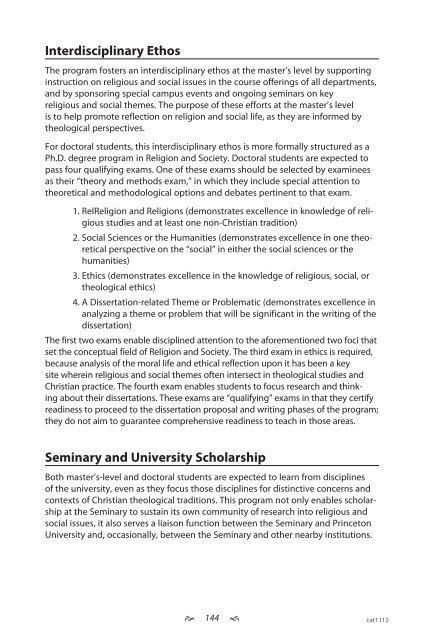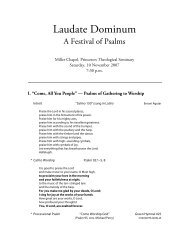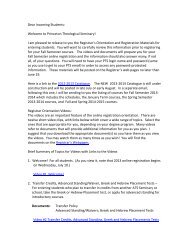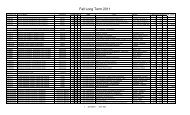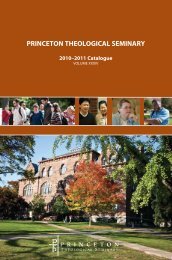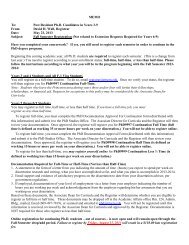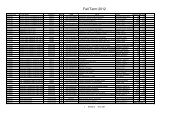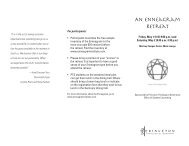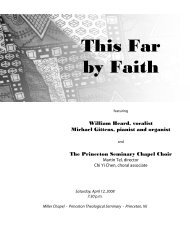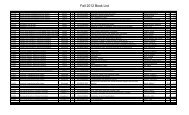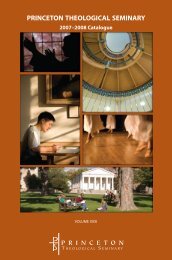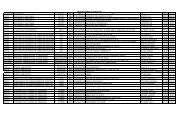2011-12 Seminary Catalogue - Portal - Princeton Theological ...
2011-12 Seminary Catalogue - Portal - Princeton Theological ...
2011-12 Seminary Catalogue - Portal - Princeton Theological ...
You also want an ePaper? Increase the reach of your titles
YUMPU automatically turns print PDFs into web optimized ePapers that Google loves.
Interdisciplinary Ethos<br />
The program fosters an interdisciplinary ethos at the master’s level by supporting<br />
instruction on religious and social issues in the course offerings of all departments,<br />
and by sponsoring special campus events and ongoing seminars on key<br />
religious and social themes. The purpose of these efforts at the master’s level<br />
is to help promote reflection on religion and social life, as they are informed by<br />
theological perspectives.<br />
For doctoral students, this interdisciplinary ethos is more formally structured as a<br />
Ph.D. degree program in Religion and Society. Doctoral students are expected to<br />
pass four qualifying exams. One of these exams should be selected by examinees<br />
as their “theory and methods exam,” in which they include special attention to<br />
theoretical and methodological options and debates pertinent to that exam.<br />
1. RelReligion and Religions (demonstrates excellence in knowledge of religious<br />
studies and at least one non-Christian tradition)<br />
2. Social Sciences or the Humanities (demonstrates excellence in one theoretical<br />
perspective on the “social” in either the social sciences or the<br />
humanities)<br />
3. Ethics (demonstrates excellence in the knowledge of religious, social, or<br />
theological ethics)<br />
4. A Dissertation-related Theme or Problematic (demonstrates excellence in<br />
analyzing a theme or problem that will be significant in the writing of the<br />
dissertation)<br />
The first two exams enable disciplined attention to the aforementioned two foci that<br />
set the conceptual field of Religion and Society. The third exam in ethics is required,<br />
because analysis of the moral life and ethical reflection upon it has been a key<br />
site wherein religious and social themes often intersect in theological studies and<br />
Christian practice. The fourth exam enables students to focus research and thinking<br />
about their dissertations. These exams are “qualifying” exams in that they certify<br />
readiness to proceed to the dissertation proposal and writing phases of the program;<br />
they do not aim to guarantee comprehensive readiness to teach in those areas.<br />
<strong>Seminary</strong> and University Scholarship<br />
Both master’s-level and doctoral students are expected to learn from disciplines<br />
of the university, even as they focus those disciplines for distinctive concerns and<br />
contexts of Christian theological traditions. This program not only enables scholarship<br />
at the <strong>Seminary</strong> to sustain its own community of research into religious and<br />
social issues, it also serves a liaison function between the <strong>Seminary</strong> and <strong>Princeton</strong><br />
University and, occasionally, between the <strong>Seminary</strong> and other nearby institutions.<br />
e 144 f<br />
cat11<strong>12</strong>


